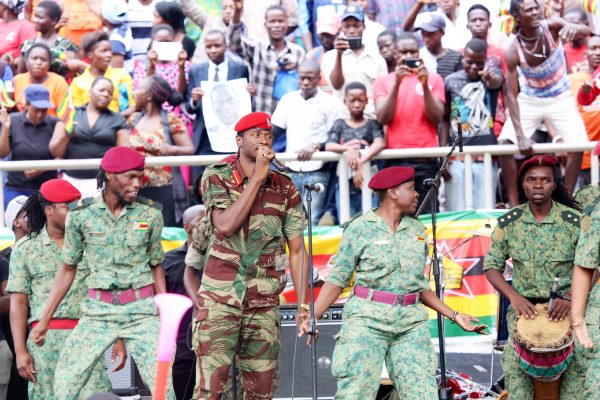
On Friday afternoon Jah Prayzah took to the stage at the National Sports Stadium as he performed before thousands of people at the inauguration of President Emmerson Mnangagwa.
By Kennedy Nyavaya/Abigail Matsikidze
Donned in his signature army camouflage alongside his Third Generation band, one would have been forgiven for thinking him and his “troops” occupy more than just a brand ambassadorial role for the Zimbabwe Defence Forces (ZDF).
His songs Kutonga Kwaro and Mdhara Vachauya may have exposed him to immense criticism from political circles, but he was at peace when the lyrics, especially from the former, temporarily became so popular in the past week that not knowing them would have been tantamount to abomination.
The euphoric chants and singalongs to his songs were so colossal, his ancestors should be proud of him.
Television cutaways showed Mnangagwa smiling when the musician was performing, perhaps not regretting one bit of his kind words two years ago when Jah Prayzah launched his sixth album titled, Jerusarema.
“I feel very proud when I see the enthusiasm from these young artists and based on this, I can see that Zimbabwe has a great future ahead,” he said then.
“With such brilliant musicians, Zimbabwe has a bright cultural future. I love you and respect you, as we go off stage we are very happy that we leave a creative generation behind.”
- Chamisa under fire over US$120K donation
- Mavhunga puts DeMbare into Chibuku quarterfinals
- Pension funds bet on Cabora Bassa oilfields
- Councils defy govt fire tender directive
Keep Reading
He also added that he was proud for his ambassadorial role and that he had done well. Perhaps, this is the basis of the thought link between the multi-awarding winning artist and Mnangagwa.
The pursuit of freedom in society is inseparable from music; even history shows that songs have always mingled with politics. Cheerful tones, energetic rhythms and eloquent lyrics have been a catalyst for movements of change.
Political music is meant to appeal not only to the oppressed, but to those sympathetic to the cause as well, and popular acts realise the power they have to inspire people to action.
The main aim of his role to date has been an attempt to demystify the army and remove the fear that is generally associated with the force.
Musicians generally have a penchant for attention and after creating debate around the lyrics of Mdhara Vachauya, it was only wise for him to follow up with something just as controversial in the name of Kutonga Kwaro.
The message in the latest release, however, sounds more politically explicit and easily related to the succession politics in the ruling Zanu PF party soon after its launch last month.
His songs literally became a political statement and playing them at the wrong time came with a responsibility and in other instances punishment.
With the ZDF becoming the darlings who initiated the new political dispensation that led to the overthrow of Robert Mugabe, through his music Jah Prayzah seems to have been strategically positioned to get his piece of the glory.
It is now that the name Soja (soldier), his other moniker, now makes more sense as he is thought to have sided with the people in ending Mugabe’s 37-year rule.
However, understandably the musician continues to distance his works from politics, saying his lyrics are open to different interpretations.
“I cannot comment on politics but music which is my industry yet politics is another aspect,” he told the media upon his arrival from an Australia tour on Thursday.
Innuendos in his music have given him more traction among his legit followers and enemies.
“Sometimes when we write songs, you do not know how they will be received but if you look at the period before my tour, a lot of things happened but your support gave me the power to continue working,” he reflected.
“You think maybe I should quit music because people do not want me anymore but it gave me strength, even my stage performance changed for the better.”
While the future is unpredictable, the status quo is that he is currently more significant than any other musician to the prevailing political situation in Zimbabwe.











